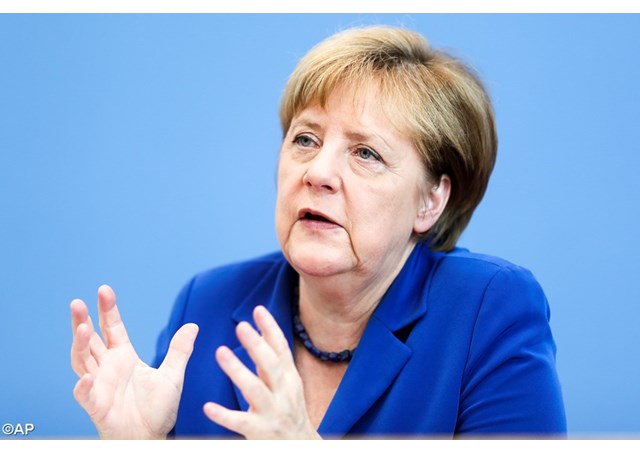
German Chancellor defends refugee influx amid rising concerns

(Vatican Radio) German Chancellor Angela Merkel has dismissed suggestions that the influx of refugees over the past year has brought Islamic extremism to Germany. Her remarks come amid European concerns that insecurity following a failed coup in Turkey will lead to a new wave of migrants fleeing war and poverty, though activists have urged youngsters in Budapest to remember their suffering.
Listen to Stefan Bos' report:
In one of her toughest comments on the issue in recent weeks, Merkel made clear that she condemns those who link the influx of more than a million refugees into Germany last year to extremism.
German news agency DPA quoted Merkel as saying that "Islamist terrorism by the Islamic State group isn't a phenomenon that came to us with the refugees, it's one that we had before too."
Merkel spoke at a political rally in Mecklenburg-Western Pomerania, where her Christian Democrats face strong competition from the nationalist Alternative for Germany party in state elections next month.
Germany has been shaken by recent attacks, two of which were the first in Germany claimed by the Islamic State group. In those, only the attackers - both asylum-seekers - were killed. In unrelated violence, a German teenager killed nine people in Munich.
TERRORISM THREAT
Yet German authorities claim they take the terrorism threat seriously. On Thursday prosecutors filed terrorism charges against a 22-year-old man accused of joining the Islamic State group in Syria and appearing in propaganda videos.
Federal prosecutors said Thursday that the German national, identified only as Tarik S. because of German privacy rules, was facing several charges including membership in a foreign terrorist organization, disturbing the peace of the dead and deprivation of liberty. The suspect appeared in an Islamic State video mocking a decapitated corpse. He returned to Germany in March because his wife was pregnant, but was detained at Frankfurt airport.
Despite a German crackdown on terror suspects, other countries such as Hungary fear it will not be enough to prevent militants from mingling among refugees. Hungary has stepped up security along its borders after some nearly 18,000 migrants illegally entered the country this year despite razor wire fences.
Neighboring Serbia has also deployed joint army and police patrols on its border with Bulgaria where migrants have been arriving through illegal routes. It says over 2,000 migrants were prevented from crossing from Bulgaria and 24 people smugglers were caught in less than a month.
However more refugees can be expected. On Thursday charity Save the Children said the number of migrants arriving in the Greek islands has nearly doubled in recent weeks, putting pressure on overcrowded camps. Greece has been a key country on the Balkan route towards more prosperous EU nations. Save the Children says that so far in August 1,367 arrivals have been reported in Greece compared with 1,721 in the entire month of May.
MORE REFUGEES SEEN
The charity says the increase is partly down to insecurity since the failed coup in Turkey last month.
Activists are now trying to raise awareness among youngsters about the suffering of refugees, including here in Budapest, at the 'Sziget', or Island festival, one of the largest music gatherings in Europe with nearly half a million people attending.
In the exhibition called ‘Tent without borders’, organized by a French and Hungarian museum there is a collection of lost objects recovered from the Hungarian-Serbian border last year.
“The exhibition shows objects found after the huge wave of refugees last year at the border villages of Roszke and Assotthalom," said organizer Hanna Foster. "It makes people think about the objects that might be significant during a migration or an escape which are personal. Which are the objects they must take and which are those which they can leave when crossing a border.”
TENTS FOR REFUGEES
Rights group Amnesty International hopes that many people will leave behind their tents at the festival. It expects at least 4,000 to remain to be offered to refugees.
“It is very important to get the attention of the visitors to the festival, that there are those in the world for whom living in a tent is not a temporary situation, it is not only for a few days and who are waiting for their safety again and to live in a dignified fashion as well,” explained Orsolya Jeney, director of Amnesty International Hungary.
Her enthusiasm isn't shared by Hungary's anti-migration Prime Minister Viktor Orbán.
His government wants people to vote against a European Union plan to divide refugees among member states in a referendum in October.
| All the contents on this site are copyrighted ©. |


